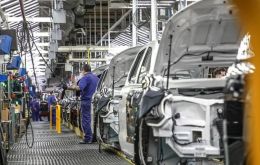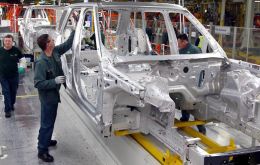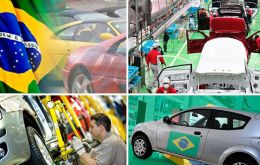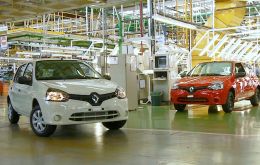MercoPress. South Atlantic News Agency
Tag: car production
-
Tuesday, June 6th 2023 - 10:09 UTC
Vehicle production grows in Argentina

Argentina's Association of Automotive Manufacturers (Adefa) announced Monday that output reached 53,282 units in May, (14.8% more than in the same month of 2022), while exports grew by over 13% in the same period.
-
Saturday, December 19th 2020 - 09:05 UTC
Mercedes Benz luxury car production in Brazil will shut down

German automaker Mercedes Benz said this week that it would wind down car production in Brazil, shutting down its small factory dedicated to producing luxury vehicles in the city of Iraccemapolis, costing some 370 jobs.
-
Tuesday, June 9th 2020 - 11:49 UTC
Brazil anticipates 40% fall in sales of cars, light commercial vehicles, trucks and buses, this year

Brazil's National Motor Vehicle Manufacturers Association (Anfavea), predicts a 40% drop for the sale of the set of new vehicles, composed of cars, light commercial vehicles, trucks and buses in 2020.
-
Thursday, June 6th 2019 - 08:37 UTC
Argentina's industrial output down 8.8%; car production falls 35.3% in twelve months

Argentina’s industrial output fell 8.8% in April compared with the same month a year ago, official data showed on Wednesday, marking 12 straight months of production losses as the economy struggles with recession and rapidly-rising consumer prices.
-
Monday, February 4th 2019 - 08:54 UTC
Japan's Nissan scrapping plans to make its X-Trail sports utility vehicle in UK

Japanese carmaker Nissan is cancelling plans to make the next model of its X-Trail sports utility vehicle in Britain, less than two months before the country is due to leave the European Union, broadcaster Sky News said on Saturday.
-
Friday, January 25th 2019 - 09:22 UTC
Brexit uncertainties: Jaguar Land Rover will extend its annual shutdown

Jaguar Land Rover is to extend its annual April shutdown in car production because of uncertainties around Brexit. The UK's biggest carmaker will be idle for an extra week because of fears of disruption at its car and engine plants at Liverpool, Birmingham and Wolverhampton.
-
Monday, July 2nd 2018 - 08:31 UTC
Leading world car makers urge US not to impose tariffs on auto imports

BMW and Hyundai Motor urged the U.S. not to impose tariffs on auto imports, joining General Motors Co. in pressing their case to the Commerce Department even as a top aide to President Donald Trump dismissed the concerns as “smoke and mirrors.”
-
Thursday, March 8th 2018 - 09:28 UTC
Chinese carmaker acquires US$ 9bn stake in Mercedes Benz, expecting to share auto technology

Li Shufu, chairman of Chinese carmaker Geely, is making waves in the global auto market after buying a US$ 9 billion stake in Germany’s Daimler. Li, 54, the son of a farmer from China’s Zhejiang province, has led a major acquisition push globally since 2010, when he took over Swedish car brand Volvo from Ford Motor, US$ 1.8 billion deal.
-
Thursday, February 2nd 2017 - 11:12 UTC
Industrial output in Brazil dropped 6.6% last year compared to 2015

Brazil's industrial output rose in December at its fastest monthly pace in two and a half years, in a likely one-time boost that did not reverse the sharp losses of one of the worst years on record for local manufacturers.
-
Friday, July 4th 2014 - 07:39 UTC
Argentine car production and exports fall, impacting on trade with Brazil

Argentina's vehicle production reached 50,904 units in June according to the Automobile Factory Association (ADEFA), 19.8% less than the 63,461 units manufactured in the same month of 2013. Taking into account the first 6 months of 2014, production fell 21.8% compared to the same period of 2013.
